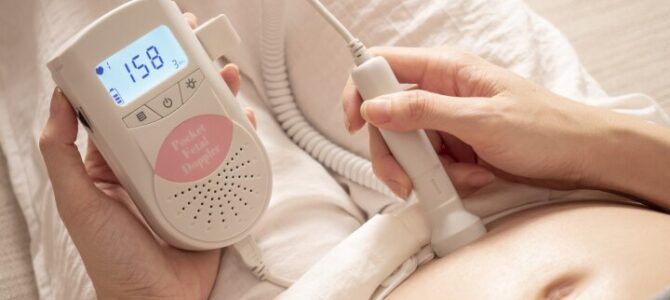Women should not use hand-held baby heart rate dopplers at home. Time to time, stories emerge where women who had a stillbirth were in fact worried about their baby’s movements but listened to their baby’s heart rate at home for re-assurance, instead of promptly seeking medical care to check the wellbeing of their baby.
I have noticed the use of these dopplers has increased, likely related to reduced face-to-face appointments during the COVID pandemic.
Home heart rate dopplers are small battery-operated devices that we use in clinics and hospital settings to determine the baby’s heart rate, and as doctors and midwives we do this fairly confidently from around 14-16w onwards.
Whilst they can be enjoyable and provide satisfaction from listening to a baby’s heart rate, their use can be dangerous when used at home:
1) You can buy them online very easily and they’re not regulated; so there’s potential inherent safety issues.
2) The main problem with these home dopplers is that they can provide a false sense of re-assurance – that means that if you are worried about something, hearing a baby’s heart rate isn’t enough to say that everything is OK. This is because it’s actually not straight forward a heart rate – sometimes you can hear the placenta, you can hear rustling noises and sometimes it doubles the actual heart rate.
Reduced movements of a baby can sometimes happen if the baby isn’t receiving enough oxygen for some reason. The home heart rate doppler isn’t designed to check on baby’s wellbeing which relates it’s oxygen levels. The wellbeing of a baby depends on much more than the heart rate alone. If you are worried about your baby’s movements, then you need to contact the midwife or doctor. To assess the wellbeing of a baby, the doctor or midwife will ask you particular questions, examine you, do a doppler themselves and decide if you need a CTG (which is a more advanced heart rate monitor run over a period of time), blood tests, or even an ultrasound.
Dr Kiran is highly trained and passionate Obstetrician & Gynaecologist with a holistic approach. He is patient and caring. Dr Kiran is based in South East Melbourne. He consults in the Casey and Frankston areas, with his main rooms in Berwick.
Contact our rooms to arrange an appointment.

